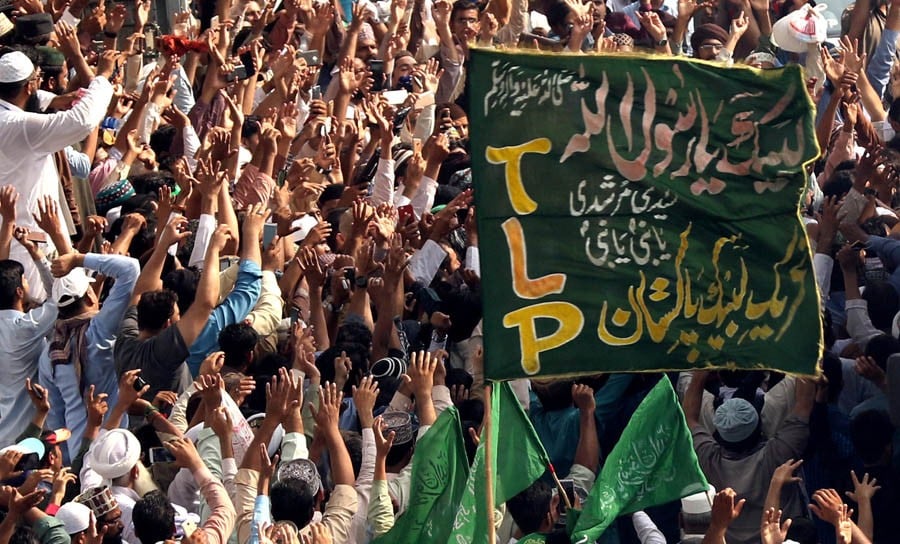
Are the TLP’s tactics tantamount to a serious threat to the state’s writ

Tehreek-e-Labbaik Pakistan emerges as a new challenge to the writ of the state with its firm stand on blasphemy-related issues. What rings the alarm is that the state, government and security forces don’t have any policy or counter-narrative to deter the TLP’s on-street activities and increasing support amongst the masses.
Formed just three years ago in 2016, the TLP has turned into a strong religious group, known for its street power. Almost every second week, the TLP Chief Khadim Hussain Rizvi makes public appearance in one of the cities, drawing masses around him for protecting blasphemy laws.
Last week, TLP conducted yet another long march from Lahore to Islamabad against the Dutch Cartoon Contest, involving the Holy Prophet (PBUH), which was cancelled later. Rizvi along with thousands of supporters left Lahore with a pledge that he would stage a sit-in at Faizabad Interchange of the twin cities and would not budge till the expulsion of the Dutch Ambassador from Pakistan and ending of diplomatic ties with Netherlands. However, cancellation of the contest left the TLP with no other option except to end the protest. Earlier, the new government had tried to stop Rizvi through negotiations but he refused.
The end of TLP’s long march could not prove a sigh of relief for the government as the TLP now intends to protest against the induction of Atif R Mian, an American-Pakistani economist, into the newly formed Economic Advisory Council as Mian belongs to the Ahmadi community.
Pakistan’s Information Minister clarified that Mian has been inducted in the EAC as a minority member. But TLP rejected the decision.
Other than the long marches, sit-ins and street protests, the TLP appears quite active against Ahmadis. On September 4, the TLP activists got registered a case against an Ahmadi in Lahore for performing sacrifice of a goat on Eidul Azha under section 298-C under which an Ahmedi may face a three-year prison and fine if he performs any religious ritual like Muslims. (TNS has the copy of an FIR registered with Guldasht Town Police Station, Lahore).
The TLP’s activities amount to serious threats to the state’s writ and the minorities in Pakistan as the TLP’s anti-blasphemy agenda attracts people from all strata of society. This fact was endorsed by a letter of National Counter Terrorism Authority (NACTA) to Interior Ministry that reads, "TLP is a serious threat to the National Security. It has destroyed the state’s writ through violent activities in Pakistan. It is recommended that the TLP should not be allowed to take part in Pakistani Politics, and should be kept under watch."
Analyst and an expert on the extremist groups, Khaled Ahmed says while talking to TNS, "We are reaping what we had sown during the last several decades. It is now almost impossible to overcome the menace of extremism as the state had nurtured it."
"We saw Qadri protesting in Islamabad and military establishment was supporting him, therefore the state could not do anything against him. TLP is also backed by the same elements but is stronger than any other group because it is carrying out its activity around ‘blasphemy’ which is the most sensitive issue for Muslims," says Ahmed, adding that "containing the TLP through action or counter-narrative is not possible because of the state’s policies and deep-rooted extremism in Pakistan".
Chairman of Pakistan Ulema Council and a Deobandi scholar Maulana Tahir Ashrafi says, "Silence of the government on TLP’s activities is meaningful. But it is a fact that the TLP is gaining popularity because of its stands on blasphemy laws and Khatm-e-Nabuwwat." He said it is also an alarming fact that people supporting Rizvi and his group are not the clergy but common people belonging to different walks of life.